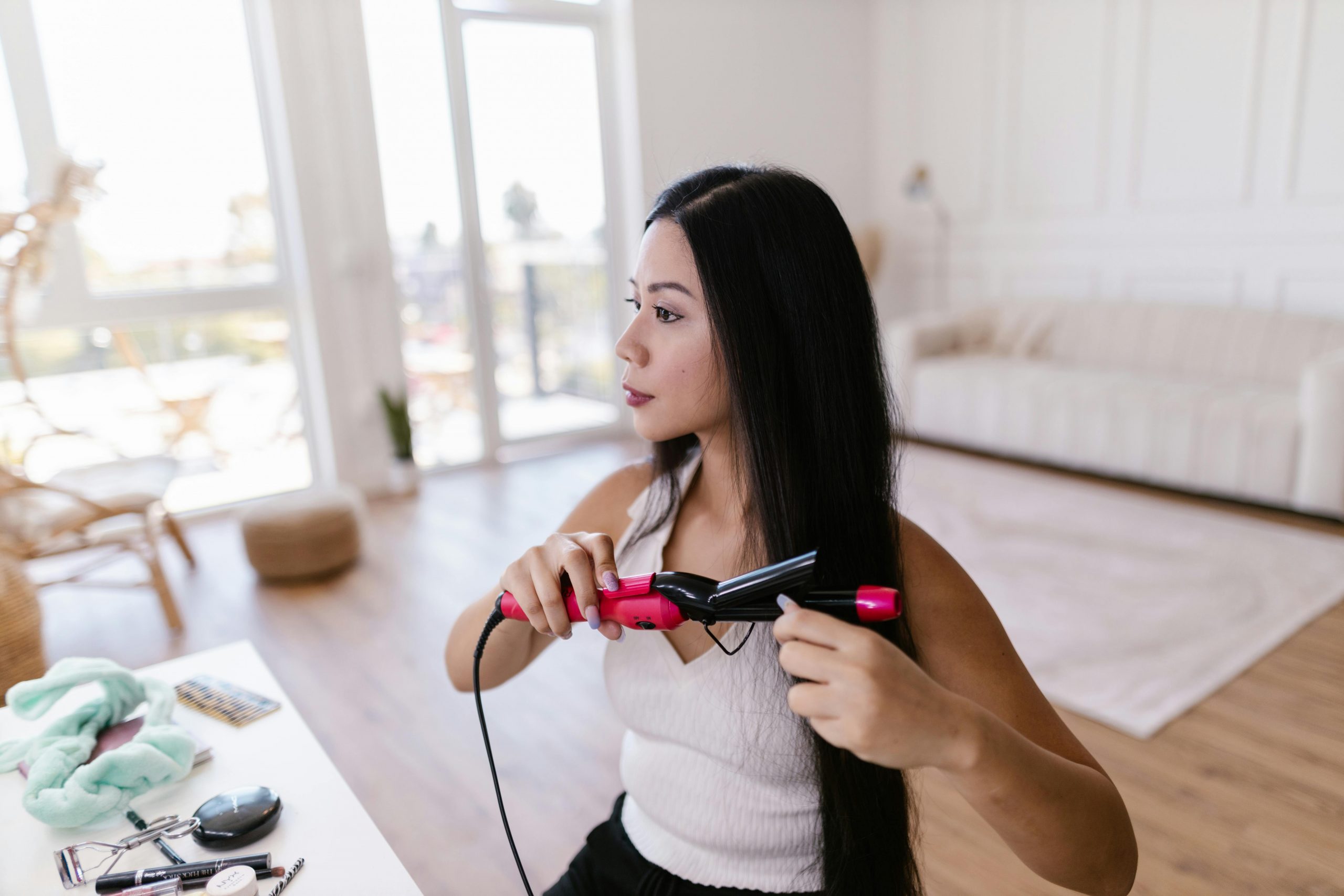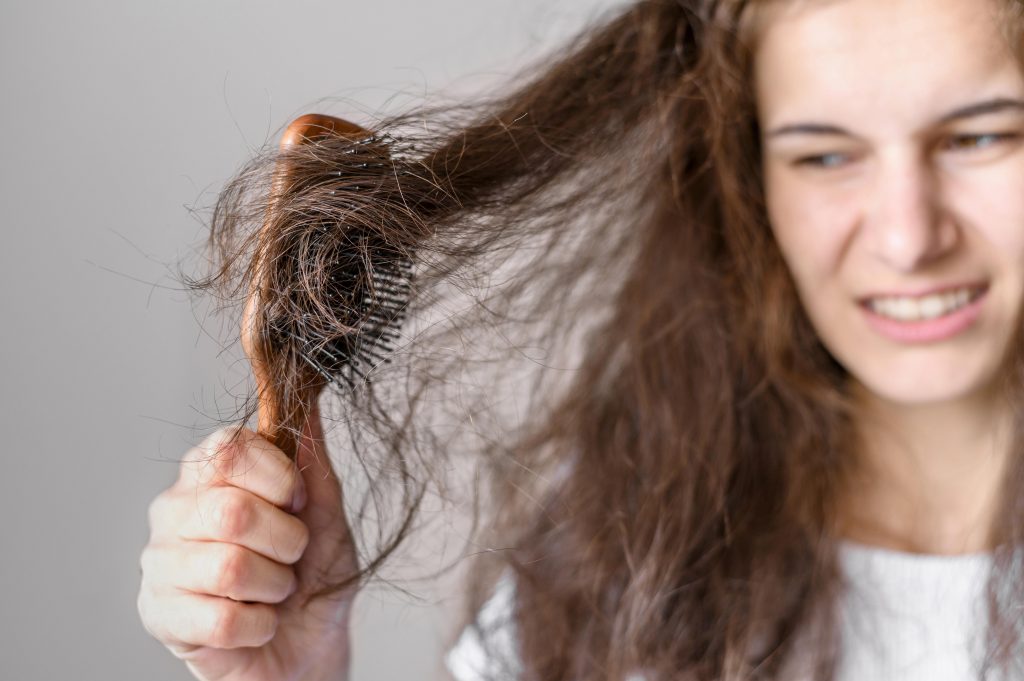If you’ve ever caught yourself wondering, “Why is my hair so frizzy?” you’re definitely not alone. Frizz can be frustrating — no matter how much time you spend styling, that unruly fuzz often pops up out of nowhere. The good news is, frizz isn’t just a random problem; it usually has specific causes. Understanding these reasons can help you take the right steps to keep your hair smooth and manageable.
In this article, we’ll explore the top reasons why your hair won’t stay smooth and share practical tips to help you tame that frizz once and for all.
- What Exactly Causes Hair Frizz?
- 1. Is Humidity Making Your Hair Frizzy?
- 2. Could Your Hair Be Too Dry?
- 3. Are You Using the Wrong Hair Products?
- 4. Does Overwashing Your Hair Make It Frizzy?
- 5. Is Heat Styling Damaging Your Hair?
- 6. Could Your Hair Type Be Naturally Prone to Frizz?
- 7. Is Your Hair Cuticle Damaged?
- 8. Are You Using the Wrong Towel or Drying Method?
- 9. Could Your Diet Affect Your Hair’s Smoothness?
- 10. Does Stress or Hormonal Changes Cause Frizz?
- What Are Some Practical Tips to Keep Hair Smooth?
- When Should You See a Professional?
- Still Wondering, “Why Is My Hair So Frizzy?”
What Exactly Causes Hair Frizz?
Frizz happens when your hair’s cuticle—the outer protective layer—becomes rough or damaged. When this happens, the hair strands lift and allow moisture to pass through unevenly, making your hair look puffy, dry, and uncontrollable.
But there’s more to it. Let’s dive into some of the most common reasons your hair turns into a frizz factory.
1. Is Humidity Making Your Hair Frizzy?
Humidity is hands down the biggest culprit behind frizzy hair — especially if you live in a climate where the air feels thick and damp. Here’s why humidity wreaks havoc on your hair:
How humidity affects hair
Your hair strands are naturally porous, meaning they absorb water from the environment. When the air is humid, moisture rushes into your hair shaft, causing the hair fibers to swell and the protective outer cuticle to lift. This raised cuticle creates that rough, uneven texture that we recognize as frizz. The swelling also breaks the uniformity of your hair strands, making them stick out in all directions.
Who is most affected?
People with curly or wavy hair types usually feel the impact of humidity the most because their hair cuticles are naturally raised or uneven due to the hair’s bends and twists. But even straight or fine hair can frizz in high humidity if it’s dry or damaged. If your hair is naturally dry, humidity will only exaggerate the problem because dry hair soaks up even more moisture trying to rebalance itself.
Quick fix
You can fight back against humidity by using anti-humidity hair products. These usually contain silicones or polymers that create a thin, invisible barrier around each strand, blocking moisture from penetrating. Look for serums, sprays, or creams labeled “anti-humidity” or “frizz control.” Applying these on damp hair before styling or on dry hair for touch-ups can help keep your hair smooth and sleek even on the most muggy days.
2. Could Your Hair Be Too Dry?

Dry hair is one of the leading reasons your hair won’t stay smooth. When your hair lacks natural oils and moisture, it becomes brittle and frizz-prone.
Why does hair get dry?
There are several common causes of dry hair:
- Overwashing: Shampoo strips the hair of its natural oils, and washing too frequently can leave your strands parched.
- Heat styling: Blow dryers, flat irons, and curling irons evaporate moisture from the hair shaft.
- Chemical treatments: Coloring, bleaching, perming, and relaxing weaken hair structure and strip oils.
- Sun exposure: UV rays damage hair proteins and dry out hair fibers.
Signs of dry hair
You might notice your hair feels rough or coarse, lacks shine, and breaks easily. Split ends become more visible, and frizz seems to appear out of nowhere—even right after styling.
How to fix dry hair
Restoring moisture is key. Incorporate deep conditioning treatments once or twice a week, using rich hair masks with ingredients like shea butter, argan oil, or coconut oil. Leave these masks on for at least 20 minutes to allow penetration. Also, swap harsh shampoos for sulfate-free, moisturizing formulas that won’t strip oils. And whenever possible, avoid heat styling or at least use protective products.
3. Are You Using the Wrong Hair Products?
It’s tempting to try every product promising smooth, frizz-free hair, but the wrong ones might actually make things worse.
Ingredients to avoid
Many hair products contain alcohol or harsh sulfates, which dry out hair and strip natural oils. Even some “lightweight” mousses and gels have drying ingredients that can leave hair brittle and frizzy.
What to look for
Aim for products that hydrate and protect your hair, like:
- Oils: Argan oil, jojoba oil, and coconut oil help seal in moisture.
- Silicones: Dimethicone or cyclopentasiloxane coat hair to smooth the cuticle and reduce frizz.
- Humectants: Glycerin and panthenol attract moisture to hair, keeping it hydrated.
- Proteins: Hydrolyzed keratin or silk proteins help strengthen hair strands.
Pro tip
Lightweight leave-in conditioners and anti-frizz serums can control flyaways and tame frizz without making hair greasy or weighed down. Always apply to damp hair for better absorption.
4. Does Overwashing Your Hair Make It Frizzy?
It’s tempting to shampoo daily for that clean, fresh feel, but overwashing can backfire.
How often should you wash?
Most hair types do well washing every 2-3 days. If your hair is oily, you might need to wash more frequently, but for dry or frizzy hair, less is often more.
What happens if you overwash?
Your scalp produces natural oils (sebum) that protect and moisturize hair. When you wash too often, you strip away these oils, and your scalp might reduce oil production or overcompensate, leading to dryness or greasiness. Without these oils, hair cuticles can’t stay smooth, causing more frizz.
Solution
Use gentle, sulfate-free shampoos and consider co-washing—washing your hair with conditioner instead of shampoo between wash days. This keeps hair clean without stripping oils. Also, try rinsing hair with cool water at the end of your wash to help seal the cuticle and reduce frizz.
5. Is Heat Styling Damaging Your Hair?

Heat tools give great results, but over time, they can seriously damage your hair and fuel frizz.
Heat damage and frizz
When exposed to high heat, the cuticle opens and loses moisture, weakening the hair shaft. Damaged cuticles lift and roughen, which means hair can’t lie flat or reflect light properly—leading to frizz and dullness.
How to protect your hair
Always use a heat protectant spray or cream before using any hot tools. These products form a protective layer that reduces moisture loss and heat damage.
Limit heat use
Whenever possible, air dry your hair or style with lower heat settings. If you must blow dry, use the coolest setting that still works, and keep the dryer moving to avoid overheating one spot.
6. Could Your Hair Type Be Naturally Prone to Frizz?
Your hair’s natural texture plays a huge role in how much frizz you experience.
Curly and wavy hair
The bends and coils create uneven surfaces where cuticles lift more easily, so these hair types tend to be naturally drier and frizzier.
Fine hair
Thinner strands are more delicate and prone to damage from brushing or styling, which can increase frizz.
Straight hair
Even straight hair isn’t immune. Damage or humidity exposure can cause frizz in straight hair by raising the cuticle.
What to do
Learn to work with your hair’s natural texture instead of fighting it. Use products and styles suited for your hair type—hydrating creams for curls, lightweight serums for fine hair, and smoothing conditioners for straight hair.
7. Is Your Hair Cuticle Damaged?
Your hair’s cuticle is like protective armor. When it’s damaged, hair can’t stay smooth.
What damages the cuticle?
- Rubbing your hair harshly with towels.
- Brushing hair aggressively, especially when wet.
- Chemical treatments like coloring and relaxing.
- Environmental exposure to sun, wind, and pollution.
Signs of damage
Dullness, rough texture, split ends, and increased frizz are all red flags your cuticle is compromised.
How to repair
Use gentle hair tools like wide-tooth combs, avoid chemicals if possible, and get regular trims to remove split ends. Deep conditioning and protein treatments can also help rebuild hair structure over time.
8. Are You Using the Wrong Towel or Drying Method?
How you dry your hair can either help tame frizz or make it worse.
Why traditional towels cause frizz
Regular bath towels have a rough texture that causes friction and static electricity. This roughness raises the hair cuticle and disrupts the hair’s smooth surface.
Better options
Switch to microfiber towels or soft cotton T-shirts. These materials are gentler on hair fibers and help reduce frizz and breakage.
Drying tips
Avoid rubbing your hair. Instead, gently squeeze or blot excess water. If you have thick or long hair, consider air drying partially before towel drying to reduce damage.
9. Could Your Diet Affect Your Hair’s Smoothness?
Healthy hair starts from within. What you eat and drink impacts the strength and moisture balance of your hair.
Nutrients for healthy hair
- Protein: Hair is primarily made of keratin, a protein that needs replenishing.
- Omega-3 fatty acids: Found in fish and flaxseed, they help keep hair hydrated.
- Vitamins A, C, D, E: Support oil production, collagen formation, and scalp health.
- Biotin: A B vitamin important for hair growth and strength.
Dehydration
If you don’t drink enough water, your hair can become dry and brittle, leading to more frizz.
How to improve
Eat a balanced diet rich in fruits, vegetables, lean proteins, and healthy fats. Stay hydrated by drinking plenty of water throughout the day.
10. Does Stress or Hormonal Changes Cause Frizz?
Your overall health can significantly impact your hair’s condition.
Stress effects
High stress triggers hormonal imbalances that disrupt oil production and cause inflammation in the scalp, resulting in dry, frizzy hair.
Hormonal changes
Pregnancy, menopause, thyroid imbalances, and other hormonal shifts can alter hair texture, oiliness, and growth cycles, often leading to increased frizz.
What helps
Try stress management techniques such as meditation, yoga, or regular exercise. If you suspect hormonal issues, consult a healthcare professional for proper diagnosis and treatment.
What Are Some Practical Tips to Keep Hair Smooth?
Now that you know the causes, here are some actionable tips to keep your hair frizz-free:
Daily Hair Care Routine Tips
- Use a sulfate-free, moisturizing shampoo.
- Apply conditioner from mid-length to ends.
- Use a wide-tooth comb instead of a brush to detangle.
- Avoid washing hair with hot water — use lukewarm or cool water instead.
- Apply a leave-in conditioner or anti-frizz serum on damp hair.
Styling Tips to Reduce Frizz
- Limit heat styling and always use heat protectant.
- Avoid towel rubbing; pat hair dry with a microfiber towel.
- Sleep on a silk or satin pillowcase to reduce friction.
- Consider protective hairstyles like braids or buns to prevent damage.
Home Treatments for Frizzy Hair
- DIY deep conditioning with coconut oil, avocado, or honey masks once a week.
- Apple cider vinegar rinses help balance hair pH and smooth cuticles.
- Avoid excessive chemical treatments and bleaching.
When Should You See a Professional?
If you’ve tried everything and your hair still won’t cooperate, it might be time to visit a hairstylist or dermatologist. Sometimes underlying scalp conditions or severe damage require professional care.
- Hair stylist: Can recommend treatments like keratin smoothing or professional conditioning.
- Dermatologist: Can check for scalp infections or conditions like eczema affecting your hair.
Still Wondering, “Why Is My Hair So Frizzy?”
Frizz can be frustrating, but it usually comes down to a few main culprits: dryness, damage, and humidity. Understanding your hair type and choosing the right products and techniques can make a big difference.
With a tailored hair care routine and a little patience, you can tame the frizz and enjoy smoother, healthier-looking hair — no more daily battles with your strands!
